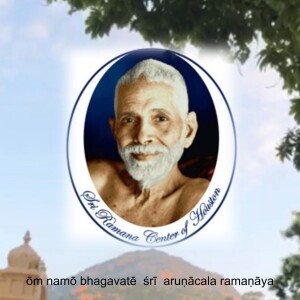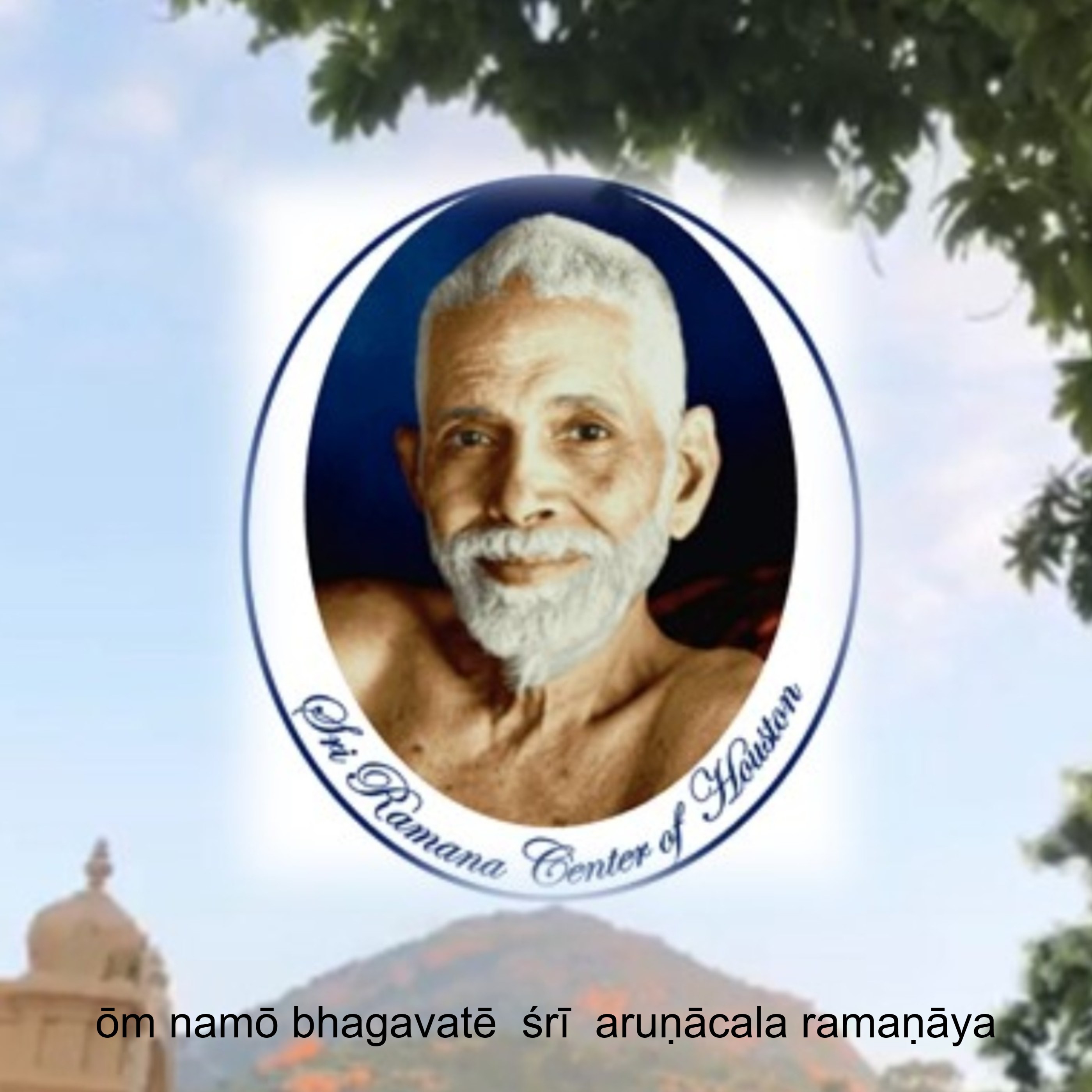Episodes

Thursday Jun 06, 2024
Uḷḷadu Nāṟpadu Anubandham verse 15
Thursday Jun 06, 2024
Thursday Jun 06, 2024
In a Zoom meeting with Sri Ramana Center, Houston, on 1st June 2024, Michael James discusses Uḷḷadu Nāṟpadu Anubandham, verse 15.
The following is Michael's translation of this verse:
சத்தியினாற் றாமியங்குந் தன்மையுண ராதகில
சித்திகணாஞ் சேர்வமெனச் சேட்டிக்கும் — பித்தர்கூத்
தென்னை யெழுப்பிவிடி னெம்மட்டித் தெவ்வரெனச்
சொன்னமுட வன்கதையின் சோடு.
śattiyiṉāṯ ṟāmiyaṅgun taṉmaiyuṇa rādakhila
siddhigaṇāñ cērvameṉac cēṭṭikkum — pittarkūt
teṉṉai yeṙuppiviḍi ṉemmaṭṭit tevvareṉac
coṉṉamuḍa vaṉkathaiyiṉ jōḍu.
பதச்சேதம்: சத்தியினால் தாம் இயங்கும் தன்மை உணராது, ‘அகில சித்திகள் நாம் சேர்வம்’ என சேட்டிக்கும் பித்தர் கூத்து ‘என்னை எழுப்பிவிடின், எம்மட்டு இத் தெவ்வர்?’ என சொன்ன முடவன் கதையின் சோடு.
Padacchēdam (word-separation): śattiyiṉāl tām iyaṅgum taṉmai uṇarādu, ‘akhila siddhigaḷ nām sērvam’ eṉa cēṭṭikkum pittar kūttu ‘eṉṉai eṙuppiviḍiṉ, emmaṭṭu i-t-tevvar?’ eṉa soṉṉa muḍavaṉ kathaiyiṉ jōḍu.
அன்வயம்: தாம் சத்தியினால் இயங்கும் தன்மை உணராது, ‘அகில சித்திகள் நாம் சேர்வம்’ என சேட்டிக்கும் பித்தர் கூத்து ‘என்னை எழுப்பிவிடின், இத் தெவ்வர் எம்மட்டு?’ என சொன்ன முடவன் கதையின் சோடு.
Anvayam (words rearranged in natural prose order): tām śattiyiṉāl iyaṅgum taṉmai uṇarādu, ‘akhila siddhigaḷ nām sērvam’ eṉa cēṭṭikkum pittar kūttu ‘eṉṉai eṙuppiviḍiṉ, i-t-tevvar emmaṭṭu?’ eṉa soṉṉa muḍavaṉ kathaiyiṉ jōḍu.
English translation: Not knowing the fact that they move by śakti, the buffoonery of lunatics who strive thus, ‘We shall acquire all siddhis’, is a match for the story of the lame person who said, ‘If anyone helps me rise, what measure are these enemies?’
Explanatory paraphrase: Not knowing the fact that they move [or the manner in which they function] [only] by śakti [divine power, namely cit-śakti, the power of pure awareness], the buffoonery of lunatics [or idiots] who strive [doing various kinds of tapas with the desire] ‘We shall [hereby] acquire all siddhis [supernatural, magical or miraculous powers]’ is a match for the story of the lame person [who could not even stand or do anything else unaided, but] who [nevertheless] said, ‘If anyone helps me rise, what measure are these enemies [that is, what match will they be for my strength]?’
Padavurai (word-explanation): சத்தியினால் (sattiyiṉāl): by śakti [divine power] {instrumental (third case) form of satti, a Tamil form of the Sanskrit śakti} | தாம் (tām): they | இயங்கும் (iyaṅgum): moving, functioning, that [they] move, in which [they] move {adjectival participle} | தன்மை (taṉmai): nature, manner, fact | உணராது (uṇarādu): not knowing, not being aware of {negative adverbial participle} | அகில (akhila): all | சித்திகள் (siddhigaḷ): siddhis, accomplishments (particularly supernatural, magical or miraculous powers) {plural of siddhi, ‘accomplishment’} | நாம் (nām): we | சேர்வம் (sērvam): will acquire {a future first person plural form of sēr, ‘join’, ‘reach’, ‘gain’ or ‘acquire’} | என (eṉa): thus {literally ‘to say’, an infinitive that is often used in an adverbial sense as an alternative to the adverbial participle eṉḏṟu, ‘saying’, which generally serves the same function as ‘that’, ‘thus’, ‘as’ or inverted commas in English} | சேட்டிக்கும் (cēṭṭikkum): who strive, exert themselves {adjectival participle of cēṭṭi, a Tamil form of the Sanskrit verb cēṣṭ, ‘be active’, make effort’, ‘exert oneself’, ‘strive’ or ‘struggle’} | பித்தர் (pittar): lunatics, madmen, fools, idiots | கூத்து (kūttu): dancing, dramatic performance, pantomime, ludicrous actions, buffoonery | என்னை (eṉṉai): me {accusative (second case) form of the first person singular pronoun} | எழுப்பிவிடின் (eṙuppiviḍiṉ): if raising, if helping to rise, if [anyone] helps to rise {a conditional form of eṙuppu, ‘cause to rise’, ‘help to rise’ or ‘raise’} | எம்மட்டு (emmaṭṭu): what measure, what extent {interrogative pronoun, formed from the interrogative prefix e, ‘what’, and maṭṭu, ‘measure’, ‘amount’, ‘degree’, ‘size’ or ‘extent’} | இ (i): this, these {proximal demonstrative prefix} | தெவ்வர் (tevvar): enemy | என (eṉa): thus {as explained above} | சொன்ன (soṉṉa): who said {past adjectival participle} | முடவன் (muḍavaṉ): lame person, cripple | கதையின் (kathaiyiṉ): of the story {inflectional base and genitive (sixth case) form of kathai, a Tamil form of the Sanskrit kathā, ‘story’} | சோடு (jōḍu): pair, partner, match, equal.
Note: This verse, which is also included in Guru Vācaka Kōvai as verse B2, is an original composition by Bhagavan. He first expressed the teaching in this verse orally, and what he said was recorded by Muruganar in verses 168 and 169 of Guru Vācaka Kōvai, on seeing which Bhagavan condensed the meaning of those two verses as this one verse.
This episode can also be watched as a video here and a more compressed audio copy in Opus format (which can be listened to in the VLC media player and some other apps) can be downloaded from here.

Friday May 31, 2024
The nature of the awareness that shines in sleep
Friday May 31, 2024
Friday May 31, 2024
In a Zoom meeting with the Ramana Maharshi Foundation UK on 25th May 2024, Michael answers various questions about Bhagavan’s teachings.
This episode can also be watched as a video here and a more compressed audio copy in Opus format (which can be listened to in the VLC media player and some other apps) can be downloaded from here.

Friday May 24, 2024
What actually exists is only ourself as we actually are
Friday May 24, 2024
Friday May 24, 2024
Michael explains the essential import of Uḷḷadu Nāṟpadu and all of Ramana's teachings in 8 key points -- 8 talks (videos), starting the first talk with the first point: what actually exists is only ourself as we actually are. After explaining the first point, Michael answers questions related to Ramana's teachings.
This episode can also be watched as a video here and a more compressed audio copy in Opus format (which can be listened to in the VLC media player and some other apps) can be downloaded from here.
Disclaimer: The book mentioned at the beginning of this episode is a private compilation by a third party that has not been read or endorsed by Michael James or by the management of Sri Ramana Center of Houston. This episode is released for educational purposes only. As a U.S.-based nonprofit spiritual organization, SRCH does not endorse for-profit products or services, nor nonprofit offerings that are not aligned with its mission to spread the teachings of Bhagavan Ramana.
- Sri Ramana Center of Houston

Tuesday May 21, 2024
The basics of Bhagavan's teachings
Tuesday May 21, 2024
Tuesday May 21, 2024
In a Zoom meeting between Sukhdev Virdee and Michael James, on 16th May 2024, Michael answered questions and talked about the basics of Bhagavan's teachings.
This episode can also be watched as a video here and a more compressed audio copy in Opus format (which can be listened to in the VLC media player and some other apps) can be downloaded from here.

Sunday May 19, 2024
Āṉma-Viddai verse 4 continued with Q&A
Sunday May 19, 2024
Sunday May 19, 2024
In a Zoom meeting with Ramana Kendra, Delhi, on 12th May 2024, Michael James continues the discussion of the meaning and implications of verse 4 of Āṉ𝘮𝘢 𝘝𝘪𝘥𝘥𝘢𝘪 and answers questions about Bhagavan's teachings.
The link to this verse is: https://happinessofbeing.blogspot.com/2023/11/anma-viddai-verse-4-self-investigation.html
கன்மா திகட்டவிழ சென்மா திநட்டமெழ
வெம்மார்க் கமதனினு மிம்மார்க் கமிக்கெளிது
சொன்மா னததனுவின் கன்மா திசிறிதின்றிச்
சும்மா வமர்ந்திருக்க வம்மா வகத்திலான்ம —
சோதியே; நிதானு பூதியே; இராது பீதியே;
இன்பவம் போதியே. (ஐயே)
English translation: For the bonds beginning with action to be untied, to rise from the devastation beginning with birth, more than whatever path, this path is what is exceedingly easy. When one just is, resting without the least action of mind, speech or body, ah, in the heart the light of oneself alone. The eternal experience. Fear does not exist. The ocean of bliss alone. (Ah, extremely easy, ...)
Explanatory paraphrase: For the bonds beginning with karma [that is, the bonds of action and of all that results from it] to be untied, and to rise [or be resurrected] from the devastation beginning with birth [that is, to transcend and become free from the miseries of embodied existence, which begins with birth and ends with death], more than whatever [other] path, this path [of ātma-vicāra] is what is exceedingly easy. When one just is, resting [calmly as pure awareness] without the least karma [action] of mind, speech or body, ah, in [one’s] heart the light of oneself alone [will shine forth clearly as ‘I am I’]. [Having thereby drowned and lost oneself (namely ego) forever in this perfectly peaceful and infinitely clear state of pure awareness, it will be clear that this is one’s] eternal experience. Fear does not [or will not] exist. The ocean of [infinite] bliss alone [will remain]. ([Therefore] ah, extremely easy, ātma-vidyā, ah, extremely easy!)
This episode can also be watched as a video here and a more compressed audio copy in Opus format (which can be listened to in the VLC media player and some other apps) can be downloaded from here.

Tuesday May 14, 2024
What is the proper way to attend to ourself or brahman?
Tuesday May 14, 2024
Tuesday May 14, 2024
In a Zoom meeting with the Ramana Maharshi Foundation UK on 11th May 2024, Michael answers various questions about Bhagavan’s teachings.
This episode can also be watched as a video here and a more compressed audio copy in Opus format (which can be listened to in the VLC media player and some other apps) can be downloaded from here.

Tuesday May 14, 2024
Śrī Aruṇācala Padigam verse 2
Tuesday May 14, 2024
Tuesday May 14, 2024
This video begins with Sadhu Om singing verse 2 of ஸ்ரீ அருணாசல பதிகம் (Śrī Aruṇācala Padigam), ‘The Eleven Verses to Arunachala’, then Michael James explains and discusses its meaning:
அன்புரு வருணா சலவழன் மெழுகா யகத்துனை நினைத்துநைந் துருகு
மன்பிலி யெனக்குன் னன்பினை யருளா தாண்டெனை யழித்திட லழகோ
வன்பினில் விளையு மின்பமே யன்ப ரகத்தினி லூறுமா ரமுதே
யென்புக லிடநின் னிட்டமென் னிட்ட மின்பதெற் கென்னுயி ரிறையே.
aṉburu varuṇā calavaṙaṉ meṙuhā yahattuṉai niṉaittunain duruhu
maṉbili yeṉakkuṉ ṉaṉbiṉai yaruḷā dāṇḍeṉai yaṙittiḍa laṙahō
vaṉbiṉil viḷaiyu miṉbamē yaṉba rahattiṉi lūṟumā ramudē
yeṉpuha liḍaniṉ ṉiṭṭameṉ ṉiṭṭa miṉbadeṟ keṉṉuyi riṟaiyē.
பதச்சேதம்: அன்பு உரு அருணாசல, அழன் மெழுகாய் அகத்து உனை நினைத்து நைந்து உருகும் அன்பு இலி எனக்கு உன் அன்பினை அருளாது ஆண்டு எனை அழித்திடல் அழகோ? அன்பினில் விளையும் இன்பமே, அன்பர் அகத்தினில் ஊறும் ஆர் அமுதே, என் புகலிட? நின் இட்டம் என் இட்டம்; இன்பு அது எற்கு, என் உயிர் இறையே.
Padacchēdam (word-separation): aṉbu uru aruṇācala, aṙaṉ meṙuhāy ahattu uṉai niṉaittu naindu uruhum aṉbu ili eṉakku uṉ aṉbiṉai aruḷādu āṇḍu eṉai aṙittiḍal aṙahō? aṉbiṉil viḷaiyum iṉbamē, aṉbar ahattiṉil ūṟum ār amudē, eṉ puhaliḍa? niṉ iṭṭam eṉ iṭṭam; iṉbu adu eṟku, eṉ uyir iṟaiyē.
English translation: Arunachala, the form of love, [after] taking possession [of me] does it befit [you] to ruin me [by] not granting your love [love for you] to me, who do not have love in which one melts, softening like wax in fire thinking of you in [one’s] heart? O happiness born [ripened or grown] in love, O satiating [or enduring] ambrosia, which wells up in the heart of devotees, what to say? Your iṣṭam [will, wish, desire or liking] is my iṣṭam; that is happiness for me, Lord of my soul [or life].
While discussing the meaning of this verse, Michael explained each sentence of it:
அன்பு உரு அருணாசல, அழன் மெழுகாய் அகத்து உனை நினைத்து நைந்து உருகும் அன்பு இலி எனக்கு உன் அன்பினை அருளாது ஆண்டு எனை அழித்திடல் அழகோ?
aṉbu uru aruṇācala, aṙaṉ meṙuhāy ahattu uṉai niṉaittu naindu uruhum aṉbu ili eṉakku uṉ aṉbiṉai aruḷādu āṇḍu eṉai aṙittiḍal aṙahō?
Arunachala, the form of love, [after] taking possession [of me] does it befit [you] to ruin me [by] not granting your love [love for you] to me, who do not have love in which one melts, softening like wax in fire thinking of you in [one’s] heart?
அன்பினில் விளையும் இன்பமே, அன்பர் அகத்தினில் ஊறும் ஆர் அமுதே, என் புகலிட?
aṉbiṉil viḷaiyum iṉbamē, aṉbar ahattiṉil ūṟum ār amudē, eṉ puhaliḍa?
O happiness born [ripened or grown] in love, O satiating [or enduring] ambrosia, which wells up in the heart of devotees, what to say?
நின் இட்டம் என் இட்டம்;
niṉ iṭṭam eṉ iṭṭam;
Your iṣṭam [will, wish, desire or liking] is my iṣṭam;
இன்பு அது எற்கு, என் உயிர் இறையே.
iṉbu adu eṟku, eṉ uyir iṟaiyē.
that is happiness for me, Lord of my soul [or life].
Other credits:
Extro Song: Lakshmi, Houston
Extro Music: Pond5
Editing/Video: Kumar Saran, Houston
- Produced by Sri Ramana Center of Houston
Read the rest of this entry »
Saturday May 11, 2024
Self-investigation, effort, doing and being
Saturday May 11, 2024
Saturday May 11, 2024
In a Zoom meeting with the San Diego Ramana Satsang (ramana-satsang-sd@googlegroups.com) on 5th May 2024, Michael answers various questions about Bhagavan’s teachings.
The passage from Day by Day (9-1-46 Afternoon) that Michael discussed at the beginning is:
It is false to speak of Realisation. What is there to realise? The real is as it is, ever. How to real-ise it? All that is required is this. We have real-ised the unreal, i.e., regarded as real what is unreal. We have to give up this attitude. That is all that is required for us to attain jnana. We are not creating anything new or achieving something which we did not have before. The illustration given in books is this. We dig a well and create a huge pit. The akasa in the pit or well has not been created by 102 us. We have just removed the earth which was filling the akasa there. The akasa was there then and is also there now. Similarly we have simply to throw out all the age-long samskaras which are inside us, and when all of them have been given up, the Self will shine, alone.
This episode can also be watched as a video here and a more compressed audio copy in Opus format (which can be listened to in the VLC media player and some other apps) can be downloaded from here.

Thursday May 09, 2024
Uḷḷadu Nāṟpadu Anubandham verse 14
Thursday May 09, 2024
Thursday May 09, 2024
In a Zoom meeting with Sri Ramana Center, Houston, on 4th May 2024, Michael James discusses Uḷḷadu Nāṟpadu Anubandham, verse 14.
The following is Michael's translation of this verse:
வினையும் விபத்தி வியோகமஞ் ஞான
மினையவையார்க் கென்றாய்ந் திடலே — வினைபத்தி
யோகமுணர் வாய்ந்திடநா னின்றியவை யென்றுமிறா
னாகமன லேயுண்மை யாம்.
viṉaiyum vibhatti viyōgamañ ñāṉa
miṉaiyavaiyārk keṉḏṟāyn diḍalē — viṉaibhatti
yōgamuṇar vāyndiḍanā ṉiṉḏṟiyavai yeṉḏṟumiṟā
ṉāhamaṉa lēyuṇmai yām.
பதச்சேதம்: வினையும், விபத்தி, வியோகம், அஞ்ஞானம் இணையவை யார்க்கு என்று ஆய்ந்திடலே வினை, பத்தி, யோகம், உணர்வு. ஆய்ந்திட, ‘நான்’ இன்றி அவை என்றும் இல். தானாக மனலே உண்மை ஆம்.
Padacchēdam (word-separation): viṉai-y-um, vibhatti, viyōgam, aññāṉam iṉaiyavai yārkku eṉḏṟu āyndiḍal-ē viṉai, bhatti, yōgam, uṇarvu. āyndiḍa, ‘nāṉ’ iṉḏṟi avai eṉḏṟum il. tāṉ-āha maṉal-ē uṇmai ām.
English translation: Investigating for whom are suchlike, karma, vibhakti, viyōga and ajñāna, is itself karma, bhakti, yōga and jñāna. When one investigates, without ‘I’ they never exist. Only being permanently as oneself is what is true.
Explanatory paraphrase: Investigating for whom [or to whom] are those [defects] such as karma [action], vibhakti [lack of devotion], viyōga [separation] and ajñāna [ignorance], is itself [or alone] [what will fulfil the purpose and aims of each of the paths of] karma [desireless action or niṣkāmya karma], bhakti [devotion or love], yōga [joining, yoking or harnessing, particularly in the sense of yoking the mind to the object or target of its meditation or to any spiritual practice, and in this context referring to practices whose aim is to bring about ‘cessation of mental activity’ (citta-vṛtti nirōdhaḥ)] and jñāna [knowledge or awareness in the sense of true self-knowledge, which is awareness of oneself as one actually is]. When one investigates [oneself keenly enough], [the ‘I’ for whom karma, vibhakti, viyōga and ajñāna seem to exist, namely ego, will cease to exist, and] without [that] ‘I’ they [namely karma, vibhakti, viyōga and ajñāna] never exist. Only being permanently as oneself [one’s own real nature, namely pure awareness] is what is true [or real].

Wednesday May 01, 2024
Bhagavan’s description of his death experience
Wednesday May 01, 2024
Wednesday May 01, 2024
In a Zoom meeting with the Ramana Maharshi Foundation UK on 27th April 2024, Michael answers various questions about Bhagavan’s teachings.
This episode can also be watched as a video here and a more compressed audio copy in Opus format (which can be listened to in the VLC media player and some other apps) can be downloaded from here.

